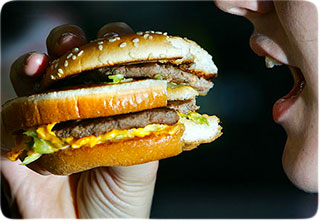 A recent newspaper headline announced: “Fatty Foods May Be Just as Addictive as Heroin and Cocaine.” This bold declaration was written due to evidence presented in a new study published in Nature Neuroscience. This three-year study provides compelling scientific evidence that junk food addiction may explain why you start drooling like Homer Simpson when you are around donuts or why you are hypnotically drawn to those golden arches.
A recent newspaper headline announced: “Fatty Foods May Be Just as Addictive as Heroin and Cocaine.” This bold declaration was written due to evidence presented in a new study published in Nature Neuroscience. This three-year study provides compelling scientific evidence that junk food addiction may explain why you start drooling like Homer Simpson when you are around donuts or why you are hypnotically drawn to those golden arches.
The Experiment
The study conducted by the prestigious Scripps Institute examined three groups of lab rats that were fed different diets for 40 days. The rats were divided into the following groups:
- Group 1 was given healthy food only
- Group 2 was offered the same healthy food with one major difference – for one hour a day, Group 2 was offered a buffet of bacon, sausage, chocolate and other high-fat goodies
- Group 3 was allowed “extended access” to the fatty buffet for up to 23 hours a day
The Results
The rats with one-hour access to the fatty buffet (Group 2) developed a pattern of binge eating and consumed most of their daily calories during the single hour they were allowed the junk food. The group with extended access (Group 3) began consuming twice as many calories overall as compared to the other rat groups and became obese by the end of the study.
As time went on, the rats in Group 2 and Group 3 ate larger portions of the high-fat foods. The study found the pleasure centers in the rats’ brain required more and more junk food to obtain the same desired “high” created by the consumption of the high-fat foods. During their extensive studies, the scientists decided to test how far the rats were willing to go to get their fatty food fix. The rats in Group 3 endured pain from electric shocks to continue eating junk food. Furthermore, the Group 3 rats starved themselves by refusing to eat at all when they were only offered healthy food.
The Conclusion
The study concluded the rats’ behavior and responses to the fatty foods are similar to humans addicted to heroin or cocaine. Dr. Paul Kenny, the lead investigator of the study, stated the rats “completely lost control over their eating behavior, the primary hallmark of addiction.” The need for more stimuli to obtain the same “high” and the willingness to endure pain to get their “fix” were two other traits the rats shared with drug addicts.
This fascinating study may help to explain why some people feel powerless to resist overindulging in junk food. If you want to conduct your own non-scientific study to test this theory, just watch people at a buffet.
Sources
Nature Neuroscience, March 28, 2010
New York Daily News, March 29, 2010
